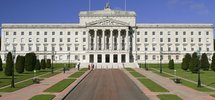| 6 mins read
The protests, related violence and killings that were sparked by the American embassy move to Jerusalem is unlikely to shift hard-line Christian opinion about Israel. For some, it may even be a welcome sign of a divine plan to end most life on earth. A nuclear war that threatens to annihilate almost everyone is a horrifying thought – unless you’re one of the chosen few who will survive the event and reunite with family, friends and God in eternal paradise.
It's not just Islamist extremists who want to take their places in a perfect afterlife: many Christians share the same aspirations. Some may even see themselves as God’s soldiers, fulfilling a prophecy outlined in their sacred scripture, the Bible’s book of Revelations. Yet the impact of evangelical, fundamentalist Christianity on American politics in the age of Donald Trump has not received enough attention from political scientists.
Christian extremists might be largely ignored by UK or European readers who think they represent a fringe movement of unhinged fundamentalists. However, in America the story is very different.
Some political scientists recognise that fundamentalist Christians are a significant section of the population. One of the most salient characteristics of fundamentalist Christians, also known as ‘evangelicals’ is their belief that the Bible is the literal word of God, something that a Gallup poll showed a quarter of Americans believe. The poll did also suggest that this proportion is shrinking, but Dr Ryan Burge, from Eastern Illinois University, found the proportion to be stable in his analysis of the General Social Survey, a highly-respected monitor of public opinion which has asked questions about Bible belief since 1984. isHi
The apocalyptic war forecast to occur at Armageddon, or ‘end times’, is at the core of Christianity. Those who take it most seriously are ‘dispensational pre-millennials’ – people who believe that certain events need to happen before Jesus returns to earth to rule. Those beliefs are held by many American evangelical Christians – not a minority church, but the biggest denomination in America. And Donald Trump won 81 per cent of the white Evangelical vote.
The connection between Christian Zionists and Israel
Many fundamentalist Christians are Zionists who believe Jews must return to Israel to rule. There are an estimated 40 million fundamentalist Christian Zionists in the United States, and Professor Paul Rogers, Bradford University, has claimed about one third of Americas’s 100 million Evangelicals support Christian Zionism.
American academic Donald Wagner writes widely about Christian Zionists who, with neo-conservatives, support hard-line Israeli politics. He has also charted how many American Christians consider that securing Israel for the Jewish people represents fulfilment of God’s plan. Indeed, Pew Research Centre found that 69 per cent of white Evangelicals believe God gave Israel to the Jewish people, and 59 per cent believe that Israel is the fulfilment of biblical prophecy.
Second, they believe that a worldwide conflagration at Armageddon will occur as a final battle between God and Satan. When (not if) God’s side wins, the prophecy stated in the Biblical book of Revelations can be fulfilled: the return to earth of Jesus and the lifting up to heaven of believing Christians.
In the main passages (Revelations 6-8) depicting the end of the world, major events happen: religious deception, war, famine, disease, persecution of Christians, earthquakes and other disasters, and finally, overwhelming devastation of the earth’s vegetation, rivers, and oceans. The last stages include partial darkening of sun, moon and stars, culminating with the sound of trumpets in a final clash between violent armies.
This may not be bad news for everyone: as one Christian website put it: ‘The end times mark not the end of the world, but the end of an age—and the beginning of a far better one’.
Trump’s inner circle
Most worryingly, those Evangelicals who take the Bible seriously include Donald Trump’s top team, who meet weekly under the supervision of biblical literalist Ralph Drollinger. When Trump isn’t available in person he gets a full summary and tweets his support.
Drollinger holds extreme conservative views, including being a climate change denier, who thinks homosexuality is a sin and opposes women’s roles in teaching, public office or ‘leading’ their families. He also unequivocally supports the right of Jews to reclaim Israel, and admonishes those who take a less literal, more interpretivist approach.
Granted, the influence of the Drollinger-led group needs to be seen in perspective. There are many other policy advisors that speak to and influence the President (including NSC, Department of Defence, State Department, and the CIA), which may have a constraining impact. However, that Drollinger does have some level of influence is beyond question.
Interpreting the exact detail of what is being said in Revelations may be the obsession of conspiracy theorists, and not all Evangelicals agree that the end is nigh. However, Trump’s fulfilment of an election promise (helping him secure the Evangelical vote) to move the American embassy from Tel Aviv to Israel’s contested capital city, Jerusalem, was widely praised by both his Christian advisors and clergy. Political scientist Professor Elizabeth Oldmixon points out that Evangelicals ‘are likely to support settlements in the West Bank, Israeli territorial expansion on both sides of the Jordan River, and support for Israeli sovereignty over Jerusalem’.
That tight connection between Biblical literalists and American foreign policy is one political scientists may want to take more seriously. Meanwhile, if you ever see Trump saying or showing that he’s blowing his own horn, my advice is to duck.







